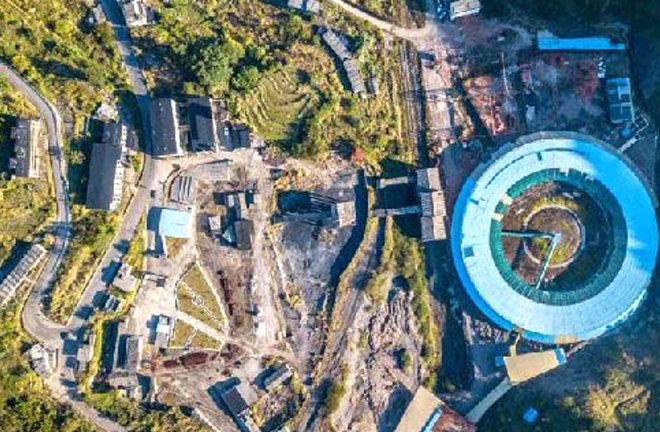Steady-state economics provides important perspectives for China

Lihua Village of Guizhou Province was a coal mining town before 2014. After several years of hard work, the Lihua economy has successfully transformed to a new green economy model. Photo: XINHUA
In response to a series of crises brought about by the traditional economic development model, Herman Daly, an American ecological economist, officially published the book Toward a Steady-State Economy in 1973. This marked the formation of modern steady-state economics, which stresses that the absolute scarcity of resources determines that an economy cannot grow infinitely.
Zhu Dajian, a professor at the School of Economics and Management at Tongji University, said that neoclassical economics emphasizes that natural capital and human-made capital can substitute for each other. Therefore, even if the increase in human-made capital is at the expense of a decrease in natural capital, as long as the sum of capitals increases, an economy will grow unbound. However, steady-state economics suggests that not all forms of natural capital are replaceable. Some key forms of natural capital, such as environmental capacity, are irreplaceable.
Yuan Yin, an associate professor at the Marx School at the Jilin University of Finance and Economics, said that steady-state economics holds that with population growth, wealth expansion and technological advancement, the ecological constraints on economic development will gradually emerge. Therefore, it is reasonable ecologically to limit the linear growth of wealth and population. The volume of material produced and consumed needs to be minimized based on the standards of production and living in an ideal society of the future. There must be a movement towards a reduction of the demand for natural ecological resources and a shift of focus from production, growth and quantity to protection, stability and quality.
Zhu added that compared with the initial period of the industrialization movement in the 18th century, human and human-made capital are no longer scarce resources. However, the scarcity of natural capital is increasingly prominent and has become a restrictive variable for economic development. Since China’s per capita natural capital is far below the world average, China’s economic and social development is initially constrained by its own natural capital conditions. In the early days of global industrialization, countries with insufficient natural capital could solve their developmental problems by acquiring the natural capital of other countries. However, with the current worldwide scarcity of natural capital, obtaining it from the outside world is becoming increasingly demanding. Therefore, neoclassical economics, which lacks an attentiveness to the scarcity of natural capital, is powerless to solve a series of problems encountered in China’s development. On the contrary, steady-state economics, which is based on the scarcity of natural capital, can provide important theoretical perspectives and research tools for China to explore green development theories and models.
Gao Honggui, a professor at the Economics School at the Zhongnan University of Economics and Law, said that the value of steady-state economics is mainly reflected in the following aspects. First, steady-state economics suggests that the economic system is an open subsystem of earth’s ecosystem. Second, it believes that economic growth is not an end but a means. People should use natural ecological resources in an appropriate way to maintain the health and sustainability of life activities and to maximize human welfare on the premise of a certain material scale. Third, it stresses that sustainable economic development can only be achieved within the limits of ecological capacity. At the same time, economic development should in turn promote harmony between humanity and nature and between humans in general.
Although steady-state economics has portrayed a bright blueprint for the sustainable development of human society, there are many theoretical bottlenecks that need to be overcome. Zhong Maochu, a professor at the Nankai Institute of Economics, said that although steady-state economics has put forward its basic theoretical premise, it has not yet formed a complete theoretical system and practical policy recommendations.
Gao added that in addition to its incomplete theoretical system and the problem of operability, steady-state economisc has a tendency toward persuasions of anti-consumerism and anti-omnipotence of technology. Therefore, steady-state economics still faces enormous challenges before it can find a consensus among our society. Zhu said that natural capital and human-made capital have a relationship of substitution and complementarity. Because of the rich variety of natural capital, it is necessary to further identify the degree of substitution of human-made capital for natural capital. In this way, we can better know about the exact extent of natural capital’s restriction on economic sustainable development.
edited by YANG LANLAN
